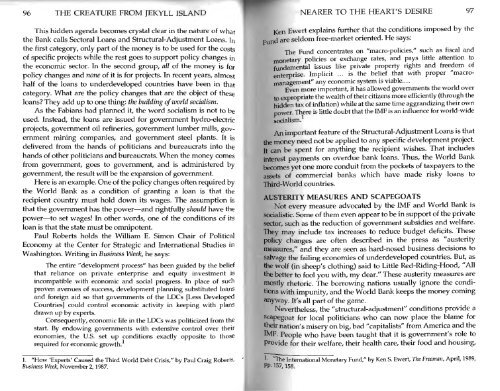You also want an ePaper? Increase the reach of your titles
YUMPU automatically turns print PDFs into web optimized ePapers that Google loves.
96 THE CREATURE FROM JEKYLL ISLAND NEARER TO THE HEART'S DESIRE 97<br />
This hidden agenda becomes crystal clear in the nature of what<br />
the Bank calls Sectoral Loans and Structural-Adjustment Loans. In<br />
the first category, only part of the money is to be used for the costs<br />
of specific projects while the rest goes to support policy changes in<br />
the economic sector. In the second group, all of the money is for<br />
policy changes and none of it is for projects. In recent years, almost<br />
half of the loans to underdeveloped countries have been in that<br />
category. What are the policy changes that are the object of these<br />
loans? They add up to one thing: the building ofworld socialism.<br />
As the Fabians had planned it, the word socialism is not to be<br />
used. Instead, the loans are issued for government hydro-electric<br />
projects, government oil refineries, government lumber mills, government<br />
mining companies, and government steel plants. It is<br />
delivered from the hands of politicians and bureaucrats into the<br />
hands of other politicians and bureaucrats. When the money comes<br />
from government, goes to government, and is administered by<br />
government, the result will be the expansion of government.<br />
Here is an example. One of the policy changes often required by<br />
the World Bank as a condition of granting a loan is that the<br />
recipient country must hold down its<br />
wages. The assumption is<br />
that the government has the power—and rightfully should have the<br />
power—to set wages! In other words, one of the conditions of its<br />
loan is that the state must be omnipotent.<br />
Paul Roberts holds the William E. Simon Chair of Political<br />
Economy at the Center for Strategic and International Studies in<br />
Washington. Writing in Business Week, he says:<br />
The entire "development process 7 '<br />
has been guided by the belief<br />
that reliance on private enterprise and equity investment is<br />
incompatible with economic and social progress. In place of such<br />
proven avenues of success, development planning substituted loans<br />
and foreign aid so that governments of the LDCs [Less Developed<br />
Countries] could control economic activity in keeping with plans<br />
drawn up by experts.<br />
Consequently, economic life in the LDCs was politicized from the<br />
start. By endowing governments with extensive control over their<br />
economies, the U.S. set up conditions exactly opposite to those<br />
required for economic growth.<br />
Ken Ewert explains further that the conditions imposed by the<br />
fund are seldom free-market oriented. He says:<br />
The Fund concentrates on "macro-policies/' such as fiscal and<br />
monetary policies or exchange rates, and pays little attention to<br />
fundamental issues like private property rights and freedom of<br />
enterprise. Implicit ... is the belief that with proper "macromanagement"<br />
any economic system is viable....<br />
Even more important, it has allowed governments the world over<br />
to expropriate the wealth of their citizens more efficiently (through the<br />
hidden tax of inflation) while at the same time aggrandizing their own<br />
r?ower. There is little doubt that the IMF is an influence for world-wide<br />
socialism.<br />
An important feature of the Structural-Adjustment Loans is that<br />
the money need not be applied to any specific development project.<br />
It can be spent for anything the recipient wishes. That includes<br />
interest payments on overdue bank loans. Thus, the World Bank<br />
becomes yet one more conduit from the pockets of taxpayers to the<br />
assets of commercial banks which have made risky loans to<br />
Third-World countries.<br />
AUSTERITY MEASURES AND SCAPEGOATS<br />
Not every measure advocated by the IMF and World Bank is<br />
socialistic. Some of them even appear to be in support of the private<br />
sector, such as the reduction of government subsidies and welfare.<br />
They may include tax increases to reduce budget deficits. These<br />
policy changes are often described in the press as "austerity<br />
measures/ 7<br />
and they are seen as hard-nosed business decisions to<br />
salvage the failing economies of underdeveloped countries. But, as<br />
the wolf (in sheep's clothing) said to Little Red-Riding-Hood, "All<br />
the better to fool you with, my dear." These austerity measures are<br />
mostly rhetoric. The borrowing nations usually ignore the conditions<br />
with impunity, and the World Bank keeps the money coming<br />
anyway. It's all part of the game.<br />
Nevertheless, the "structural-adjustment" conditions provide a<br />
scapegoat for local<br />
politicians who can now place the blame for<br />
their nation's misery on big, bad "capitalists" from America and the<br />
*MF. People who have been taught that it is government's role to<br />
provide for their welfare, their health care, their food and housing,<br />
1. "How 'Experts' Caused the Third World Debt Crisis/' by Paul Craig Roberts,<br />
Business Week, November 2, 1987.<br />
b "The International Monetary Fund/' by Ken S. Ewert, The Freeman, April, 1989,<br />
PP* 157, 158.


